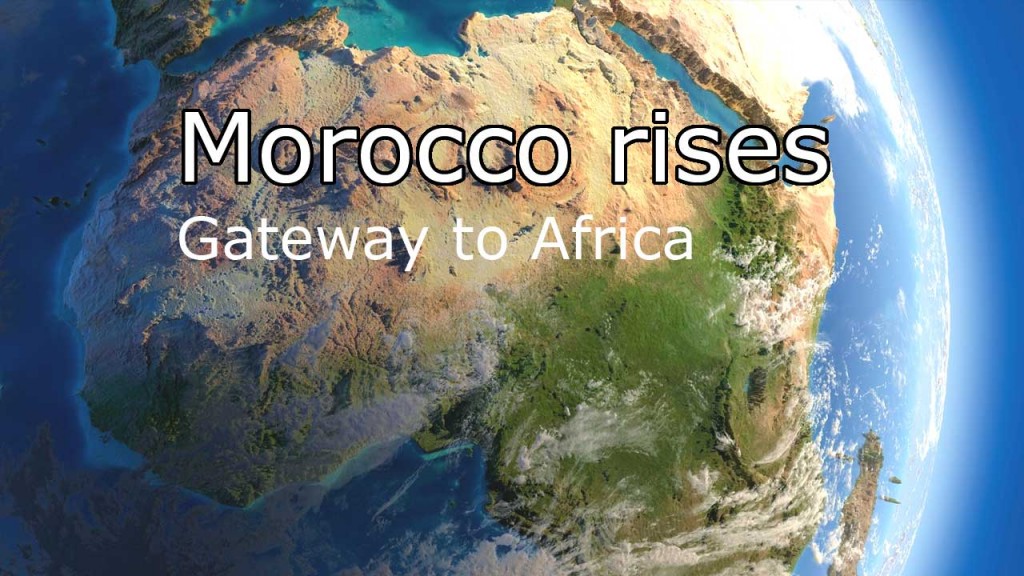A rising star in the west
 Adapted from the economist
Adapted from the economist
A smaller country than Egypt, and far from the upheavals to the east, Morocco has been much more successful than the competition at holding on to its all-important tourist industry while shifting away from tailored adventures to the mass market. It is building up its manufacturing sector by seeking to link into the European supply chain, doing for French industry, in particular, what eastern Europe has done for German companies. Renault-Nissan and PSA Peugeot Citroën have built new car-assembly plants in Morocco, and plans are in hand to develop a wider network of local suppliers promoted as a game changer for the industrial fabric of the nation.
Industrial ambitions
Even more ambitiously, Morocco is working to build an aircraft industry, based outside Casablanca’s international airport. Emerging from the embryo of Royal Air Maroc’s engine-maintenance business, an early step was the manufacture of high-specification electrical wiring for aircraft. On the factory floor of Matis Aerospace, in a leafy industrial estate, women are hunched over the cables—producing a wide array of complex parts for Boeing on one side of the main aisle, Airbus on the other.
Nearby a subsidiary of Safran, a French technology group, is making carbon-fibre casings for jet engines. Bombardier, a Canadian aircraft-maker, is setting up shop to make parts for its airframes. The government is part-funding a vocational training school for the aeronautical industry.
Hamid Benbrahim el-Andaloussi, the president of GIMAS, the aerospace industry’s trade body, says Moroccan factories can make components 30% more cheaply than European or American ones without any loss of quality. At present the industry consists of about 100 companies with 11,500 employees and $1 billion-worth of exports; by 2020, he predicts, it will more than double in size.
Both gateway and hub for West Africa
Morocco shows a dynamism that is sorely needed across the Arab region. With the ultra modern Tangiers container port, Casa Finance City recently awarded status of first finanical market in Africa, and an international network of Moroccan banks spanning Nouakchott and Dakar to Abidjan & Accra, Morocco is consolidating its claim as both hub and gateway for all of West Africa.
Strong agribusiness potential
The sector continues to offer profitable investment opportunities for foreign investors, says Philippe Marchadour, a director of Biolandes, which grows orange blossoms and roses for European perfume companies.
Morocco is an obvious destination for a wide range of growers because it enjoys several distinct climatic zones, explains Mr Marchadour. “You have the Mediterranean, the Atlantic, the seaside, the mountains,” he says. “You can grow bananas and you can grow pears. There is a great range. Europe is just next door, and produce can be transported by truck. There is an abundance of labour.”
Monarchies and the Arab Spring
Morocco and Jordan do not produce oil, but their kings, Mohammed VI and Abdullah II, derive some authority from religion, pointing to their descent from the Prophet Muhammad. They also claim political legitimacy: Morocco’s former sultan, Mohammed V, was exiled to Madagascar by the French, and the demand for his return became the rallying cry for Moroccan nationalists. The Hashemites, for their part, raised the flag of revolt against Turkish rule in 1916.
Perhaps more important than heritage, though, has been the ability of HRH Mohamed VI to adapt to changing times. Unlike the ruling families of the Gulf, where royals hold posts throughout the government bureaucracy, those of Morocco (and Jordan) tend to stand more aloof from day-to-day government. They have also shown a knack for co-opting some critics, or at least maintaining dialogue with them. During the Arab spring both made a show of responding to demands for greater freedom. Both countries introduced limited constitutional reforms and held parliamentary elections. In Morocco, a brotherhood inspired political party won a popular mandate to head a four-party coalition.
A nascent consumer boom
According to Planet Retail, the retail landscape in Morocco is changing. Supermarkets, in partnership with major French, German and Turkish chains, have sprung up in urban areas, which, in a way, have revolutionized not only Moroccans’ shopping habits, but their lifestyle as well. Since then, consumers have been increasingly moving away from fresh ingredients and traditional food preparation and toward greater consumption of pre-packaged, processed and frozen foods.
A booming demand for mass market items.
Distribution chains have focused on health, speed and the lure of finished or semi-finished products. They provide a wider range of ready-made meals and canned foods that are gaining in popularity with Moroccans, who are adopting new eating and cooking habits that can save them time. Manufacturers of processed and frozen foods have been able to capitalize on this new trend, which is a good indicator of the vitality of mass distribution. The introduction of international brand outlets into the Moroccan marketplace has enormously increased the supply of products and services.
Large landscapes of un-met demand
The highway and rail infrastructure and the electrification that the government has implemented over the past decade are also beginning to affect the lifestyle of rural consumers, although most low-income rural consumers continue to rely on traditional forms of shopping. Some, though, are beginning to shop at independent grocery stores and small markets, where the choice and supply of convenience foods is more varied.